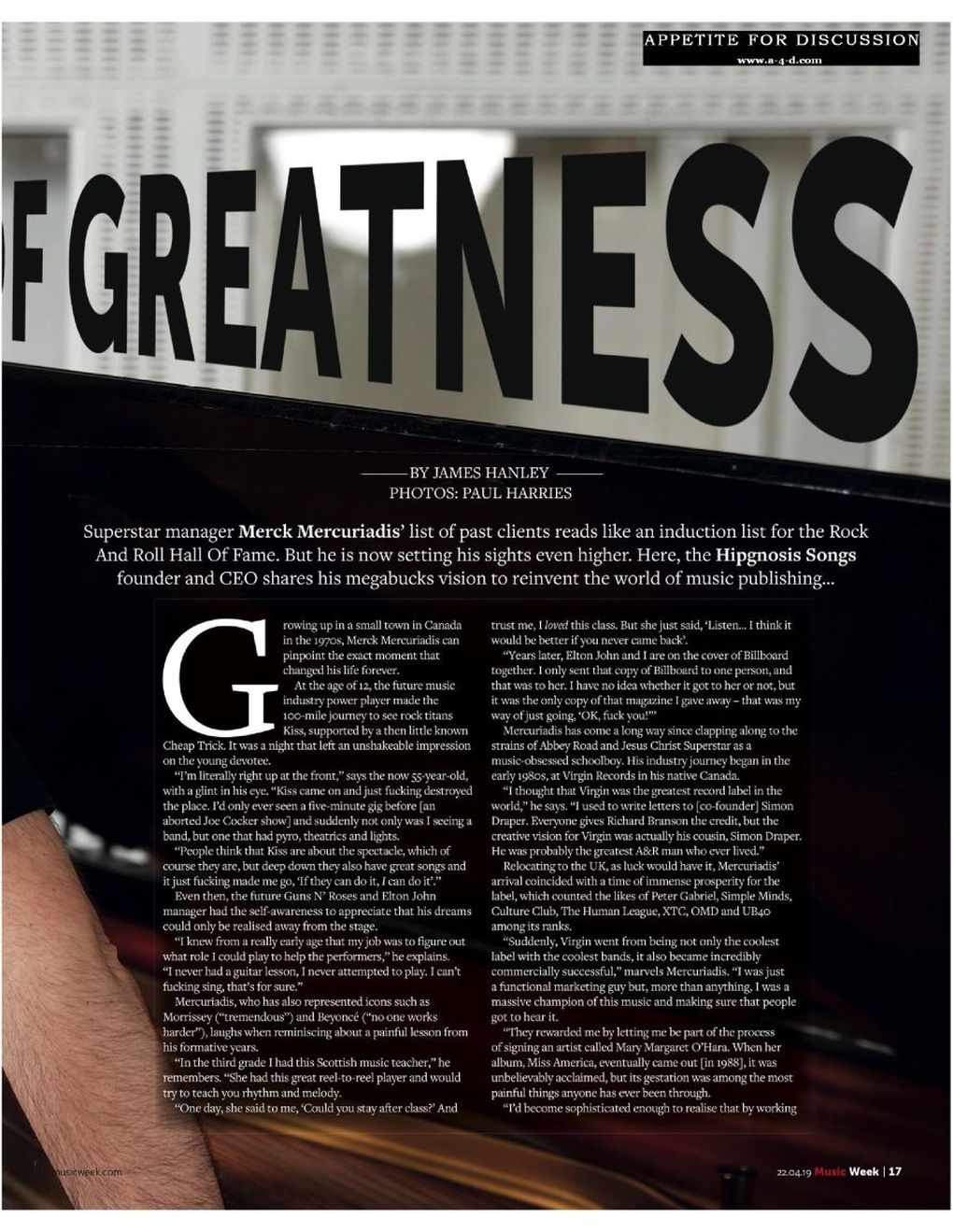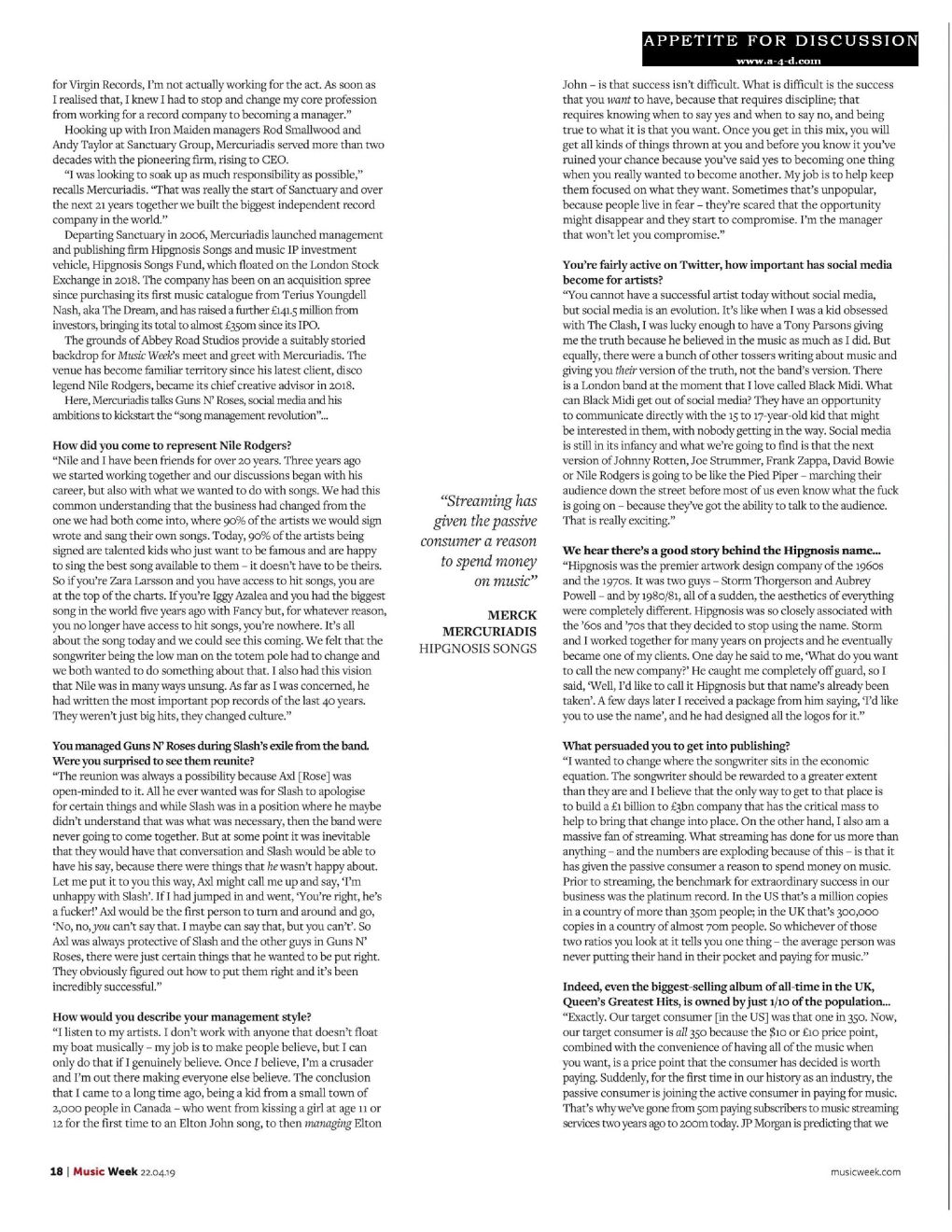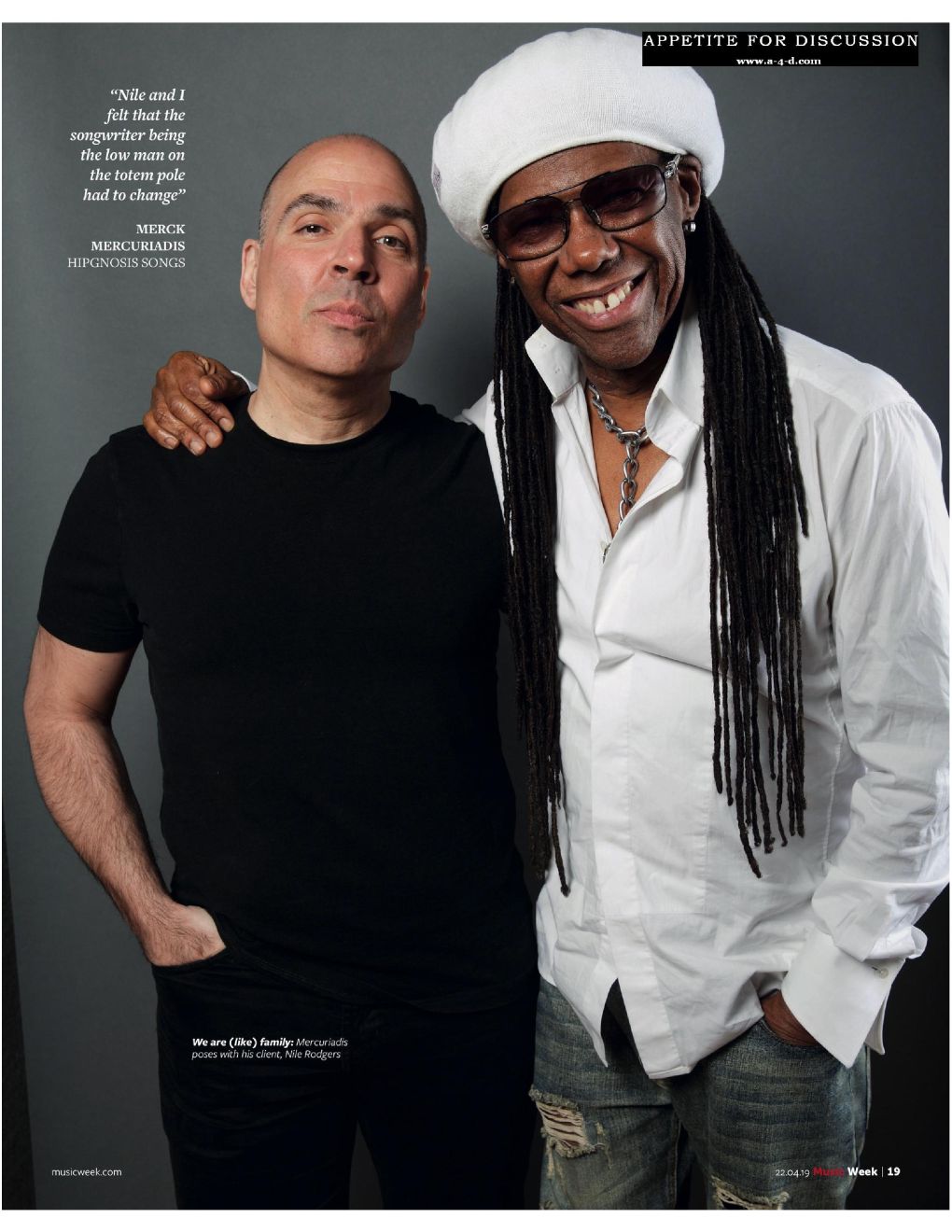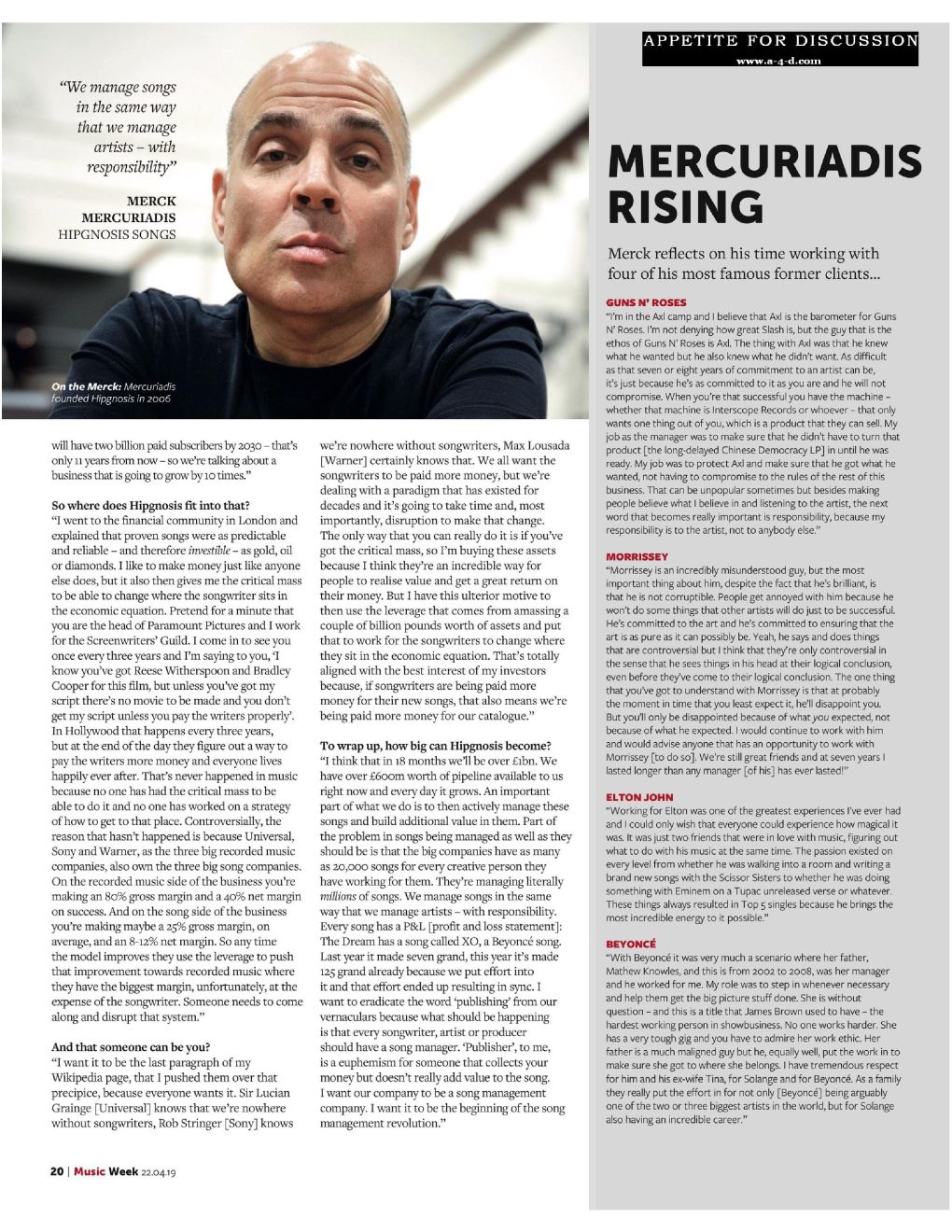2019.04.22 - Music Week - Interview with Merck Mercuriadis
2 posters
Page 1 of 1
 2019.04.22 - Music Week - Interview with Merck Mercuriadis
2019.04.22 - Music Week - Interview with Merck Mercuriadis





Transcript of the related parts:
------------------------------------
MERCK OF GREATNESS
By James Hanley
Growing up in a small town in Canada in the 1970s, Merck Mercuriadis can pinpoint the exact moment that changed his life forever. At the age of 12, the future music industry power player made the 100-mile journey to see rock titans Kiss, supported by a then little known Cheap Trick. It was a night that left an unshakeable impression on the young devotee.
“I’m literally right up at the front,” says the now 55-year-old, with a glint in his eye. “Kiss came on and just fucking destroyed
the place. I’d only ever seen a five-minute gig before [an aborted Joe Cocker show] and suddenly not only was I seeing a band, but one that had pyro, theatrics and lights. “People think that Kiss are about the spectacle, which of course they are, but deep down they also have great songs and it just fucking made me go, ‘If they can do it, I can do it’.”
Even then, the future Guns N’ Roses and Elton John manager had the self-awareness to appreciate that his dreams could only be realised away from the stage.
“I knew from a really early age that my job was to figure out what role I could play to help the performers,” he explains. “I never had a guitar lesson, I never attempted to play. I can’t fucking sing, that’s for sure.”
Mercuriadis, who has also represented icons such as Morrissey (“tremendous”) and Beyonce (“no one works harder”), laughs when reminiscing about a painful lesson from his formative years.
“In the third grade I had this Scottish music teacher,” he remembers. “She had this great reel-to-reel player and would try to teach you rhythm and melody. “One day, she said to me, ‘Could you stay after class?’ And trust me, I loved this class. But she just said, ‘Listen... I think it would be better if you never came back’.
“Years later, Elton John and I are on the cover of Billboard together. I only sent that copy of Billboard to one person, and that was to her. I have no idea whether it got to her or not, but it was the only copy of that magazine I gave away - that was my way of just going, ‘OK, fuck you!”’
Mercuriadis has come a long way since clapping along to the strains of Abbey Road and Jesus Christ Superstar as a music-obsessed schoolboy. His industry joumey began in the early 1980s, at Virgin Records in his native Canada.
“I thought that Virgin was the greatest record label in the world,” he says. “I used to write letters to [co-founder] Simon Draper. Everyone gives Richard Branson the credit, but the creative vision for Virgin was actually his cousin, Simon Draper. He was probably the greatest A&R man who ever lived.”
Relocating to the UK, as luck would have it, Mercuriadis’ arrival coincided with a time of immense prosperity for the label, which counted the likes of Peter Gabriel, Simple Minds, Culture Club, The Human League, XTC, OMD and UB40 among its ranks.
“Suddenly, Virgin went from being not only the coolest label with the coolest bands, it also became incredibly commercially successful,” marvels Mercuriadis. “I was just a functional marketing guy but, more than anything, I was a massive champion of this music and making sure that people got to hear it.
“They rewarded me by letting me be part of the process of signing an artist called Mary Margaret O’Hara. When her album, Miss America, eventually came out [in 1988], it was unbelievably acclaimed, but its gestation was among the most painful things anyone has ever been through.
“I’d become sophisticated enough to realise that by working for Virgin Records, I’m not actually working for the act. As soon as I realised that, I knew I had to stop and change my core profession from working for a record company to becoming a manager.”
Hooking up with Iron Maiden managers Rod Smallwood and Andy Taylor at Sanctuary Group, Mercuriadis served more than two decades with the pioneering firm, rising to CEO.
“I was looking to soak up as much responsibility as possible,” recalls Mercuriadis. “That was really the start of Sanctuary and over the next 21 years together we built the biggest independent record company in the world.”
Departing Sanctuary in 2006, Mercuriadis launched management and publishing firm Hipgnosis Songs and music IP investment vehicle, Hipgnosis Songs Fund, which floated on the London Stock Exchange in 2018. The company has been on an acquisition spree since purchasing its first music catalogue from Terius Youngdell Nash, aka The Dream, and has raised a further £141.5 million from investors, bringing its total to almost £350m since its IPO.
The grounds of Abbey Road Studios provide a suitably storied backdrop for Music Week's meet and greet with Mercuriadis. The venue has become familiar territory since his latest client, disco legend Nile Rodgers, became its chief creative advisor in 2018.
Here, Mercuriadis talks Guns N' Roses, social media and his ambitions to kickstart the “song management revolution”...
[...]
You managed Guns N’ Roses during Slash’s exile from the band. Were you surprised to see them reunite?
“The reunion was always a possibility because Axl [Rose] was open-minded to it. All he ever wanted was for Slash to apologise for certain things and while Slash was in a position where he maybe didn’t understand that was what was necessary, then the band were never going to come together. But at some point it was inevitable that they would have that conversation and Slash would be able to have his say, because there were things that he wasn’t happy about. Let me put it to you this way, Axl might call me up and say, ‘I’m unhappy with Slash’. If I had jumped in and went, 'You’re right, he’s a fucker!’ Axl would be the first person to turn around and go, ‘No, no, you can’t say that. I maybe can say that, but you can’t’. So Axl was always protective of Slash and the other guys in Guns N’ Roses, there were just certain things that he wanted to be put right. They obviously figured out how to put them right and it’s been incredibly successful.”
How would you describe your management style?
“I listen to my artists. I don’t work with anyone that doesn’t float my boat musically - my job is to make people believe, but I can only do that if I genuinely believe. Once I believe, I’m a crusader and I’m out there making everyone else believe. The conclusion that I came to a long time ago, being a kid from a small town of 2,000 people in Canada - who went from kissing a girl at age 11 or 12 for the first time to an Elton John song, to then managing Elton John - is that success isn’t difficult. What is difficult is the success that you want to have, because that requires discipline; that requires knowing when to say yes and when to say no, and being true to what it is that you want. Once you get in this mix, you will get all kinds of things thrown at you and before you know it you’ve ruined your chance because you’ve said yes to becoming one thing when you really wanted to become another. My job is to help keep them focused on what they want. Sometimes that’s unpopular, because people live in fear - they’re scared that the opportunity might disappear and they start to compromise. I’m the manager that won’t let you compromise.”
[...]
MERCURIADIS RISING
Merck reflects on his time working with four of his most famous former clients...
GUNS N’ ROSES
“I’m in the Axl camp and I believe that Axl is the barometer for Guns N’ Roses. I’m not denying how great Slash is, but the guy that is the ethos of Guns N’ Roses is Axl. The thing with Axl was that he knew what he wanted but he also knew what he didn’t want. As difficult as that seven or eight years of commitment to an artist can be, it’s just because he’s as committed to it as you are and he will not compromise. When you’re that successful you have the machine -whether that machine is Interscope Records or whoever - that only wants one thing out of you, which is a product that they can sell. My job as the manager was to make sure that he didn’t have to turn that product [the long-delayed Chinese Democracy LP] in until he was ready. My job was to protect Axl and make sure that he got what he wanted, not having to compromise to the rules of the rest of this business. That can be unpopular sometimes but besides making people believe what I believe in and listening to the artist, the next word that becomes really important is responsibility, because my responsibility is to the artist, not to anybody else.”
[...]
***
Thanks to MillionsofSpiders from mygnr for pointing this interview out to us.
Last edited by Blackstar on Tue Jan 02, 2024 2:22 pm; edited 6 times in total

Blackstar- ADMIN
- Posts : 13903
Plectra : 91338
Reputation : 101
Join date : 2018-03-17
 Re: 2019.04.22 - Music Week - Interview with Merck Mercuriadis
Re: 2019.04.22 - Music Week - Interview with Merck Mercuriadis
Interesting. Would love for past manageres after 2000 to talk more about the period.

Soulmonster- Band Lawyer
-

Posts : 15970
Plectra : 77382
Reputation : 830
Join date : 2010-07-06
 Similar topics
Similar topics» 2005.03.05 - Billboard - Interview with Merck Mercuriadis
» 2006.12.15 - An Open Letter To Guns N' Roses Fans From Merck Mercuriadis
» 2022.02.02 - This Week in Music History with Marty Miller - Interview with Duff
» 2019.08.28 - Guitarist/Music Radar - Interview with Richard
» 2019.01.27 - Thomann Music - Interview with Duff at NAMM
» 2006.12.15 - An Open Letter To Guns N' Roses Fans From Merck Mercuriadis
» 2022.02.02 - This Week in Music History with Marty Miller - Interview with Duff
» 2019.08.28 - Guitarist/Music Radar - Interview with Richard
» 2019.01.27 - Thomann Music - Interview with Duff at NAMM
Page 1 of 1
Permissions in this forum:
You cannot reply to topics in this forum
